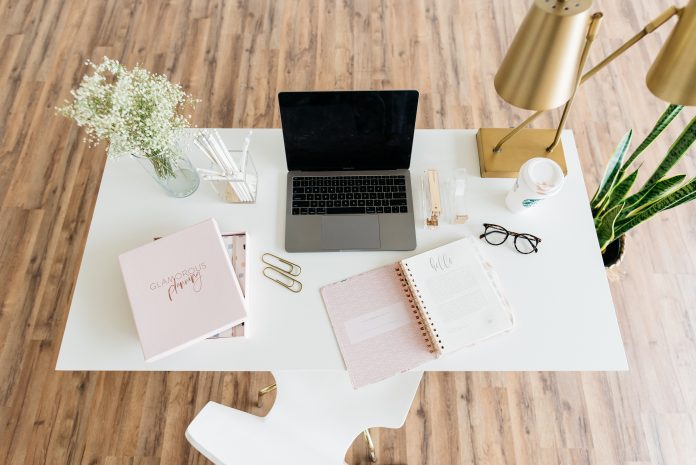Whether your company allows you to work remotely or you run your own business from the comfort of your house, there are a number of must-haves that you’ll need to work your best from a home office. Working from home has its challenges, but having a well-designed office can tremendously improve your productivity. And if you’re self-employed, you may also be able to take the home office tax deduction when it comes time to file!
If you’re interested in designing your ideal home-based workspace, start with these five home office must-haves that will allow you to make any old space a den of productivity.
1. Dedicated workspace
We’re not here to tell you how you can work most efficiently, but there’s no denying that working from home comes with battling the many ever-present distractions. If your normal workday starts with you plopping down on the couch with your laptop in your lap (duh), that TV will be screaming for your attention the whole time. If you work from your bed, how good would it feel to just close your eyes for ten minutes?
Sure, you could set up shop at the dining room table or kitchen counter, but having a dedicated workspace can allow you to close the door, rid yourself of distractions, and get down to business. If you have visitors to your office or frequently use video chat to communicate with your team, clients, or other professionals, you should also think about what you want to convey to other people. Do you want clients on your video call to see your kitchen behind you? Or would you rather them see a clean, professional office space?
Discipline is key when working from home, so designating a room in your house as your office gives you a place to “go to work.” This can be the difference between moseying around in your sweats and eventually getting to work versus spending your workday as productive as possible.
2. The right items in your dedicated workspace
You’ve picked your dedicated office space, so now it’s time to set it up. When outfitting your home office, consider how you want your work environment to feel. Make sure you have the right furniture for your personal vibe, photos or artwork that motivate you, and anything else that will contribute to a productive day at work. This could be as simple as a set of file drawers or a pen cup and fresh notepads.
Build your workspace whichever way works best for you, but here are some basics to get you started:
- Desk (appropriately sized for your type of work)
- Comfortable chair
- Filing cabinets
- Organizational tools
- Pens, notepads, stationary
- Business cards
- Plants
You don’t only want your home office to look and feel a certain way–you also want it to be functional. Sitting cross-legged on the floor in the center of your room with your laptop on the floor and paperwork strewn around you probably isn’t the most suitable way to work.
3. The right technology and equipment
Having a dedicated workspace can help put you in the mindset of being “at work,” but in order to get your work done, you also need to make sure you have the right job-specific technology and equipment on hand. This is especially true if you work in the company office a few days a week and from home on the other days. You don’t want the quality of your efforts to drop off because you don’t have the right equipment to get your work done.
Every business will be a little different, and the function of your job will help determine what kind of hardware and software you need. For instance, if you run a profitable Etsy store selling custom-made artwork and stickers, you’re going to need a computer to run your online store, a printer suitable for printing stickers and shipping labels, and possibly dedicated software to manage your inventory. If, however, you run a freelance marketing consulting business, you might only need a computer and possibly a standard printer.
Setting up your home office with the proper equipment will allow your work to run more smoothly and more efficiently. But did you know you can also claim these items as business expenses if you have your own small business? Keep this in mind if you’re on the fence about spending money on your new freelance business.
4. Stable internet
The world is connected, so there’s no way around the need for the internet in modern business. Stable internet is not something worth scrimping on, which means any old internet service might not cut it for you. No one wants their work interrupted by a faulty internet connection. And when unstable internet rears its ugly head, it can feel like your world is collapsing in on itself like a dying star — especially because this almost always happens during your most important meeting or with a critical deadline looming.
Okay, maybe bad internet isn’t as extreme as the world literally imploding, but in order to run a business or telecommute successfully, it’s worth investing in fast, high-quality internet. Doing so will pay for itself over time in increased productivity and reduced stress levels. Luckily, there are several business credit cards that allow you to earn bonus rewards on your internet bill, which we’ll touch on next.
5. A business credit card
You’re working hard on running your business out of your home, so you might as well take advantage of any money-saving strategies available to you. This includes taking the home office tax deduction if you qualify, as well as benefiting from the perks of applying for a small business credit card.
The right business credit card will have spending categories that align with your business expenses. This will allow you to earn cash back or travel rewards on your regular spending. Bonus categories for business credit cards can include expenses like internet service, shipping and postage, travel, and advertising costs. If you’re self-employed and you aren’t using a business credit card for these expenses, you’re leaving money on the table.
Additionally, if you run your own business, keeping your personal and business finances separate is a must. This will help keep your expenses organized, which saves time on bookkeeping and ensure you are more prepared when tax season rolls around. You don’t want to have to spend countless hours digging through a year’s worth of transactions to locate all your business expenses when you could have just used separate bank accounts and credit cards to begin with. Time is money, so don’t waste it!
Conclusion
If you have an extra room in your house, consider designating it as your home office. That way, you have a physical space where you can switch from being at home to being “at work.” Once you’ve got your home office, make sure to fill it with everything you need to get your job done. This includes any technology and equipment you may need, as well as furniture and anything else to create your ideal workspace. Don’t forget to pay for all of this with a business credit card so you can make bookkeeping easier, and earn valuable credit card rewards.
Whether you’re afforded the luxury of being able to work from home or you’re running your own small business, these five home office essentials will help transform your workspace into an efficient and productive one.
Find a Home-Based Business to Start-Up >>> Hundreds of Business Listings.
















































